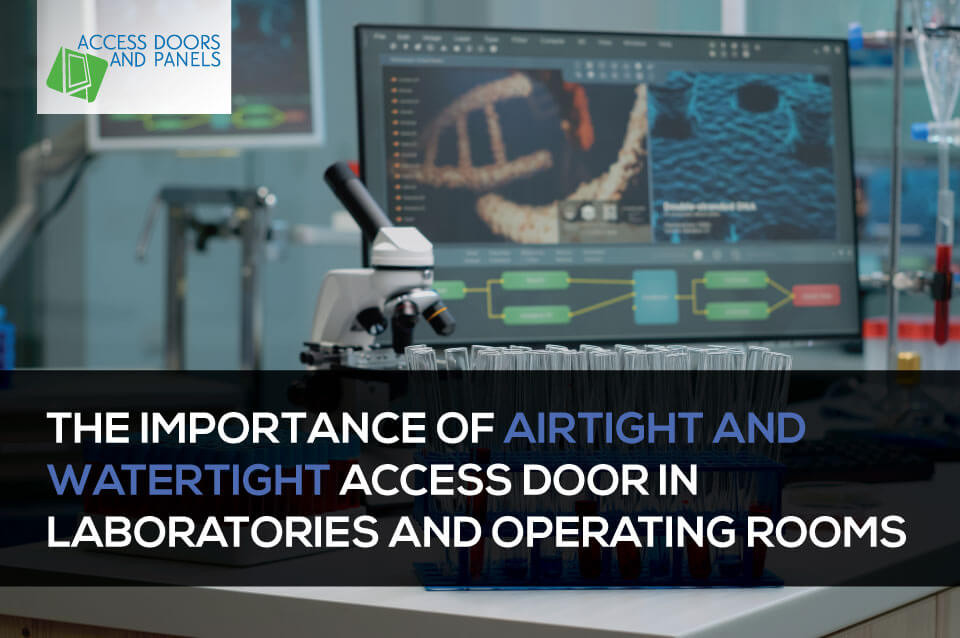The Importance of Airtight and Watertight Access Door in Laboratories and Operating Rooms
Posted by Access Doors and Panels on 19th Jan 2022
In recent times, airborne diseases such as the Covid-19 have struck the whole world leaving the medical field in a constant state of alertness. It is mandatory to follow strict protocols, especially in laboratories and operating rooms. These places have always been essential for healthcare professionals to perform their crucial roles.
Most labs and clean rooms require airtight construction to create differential pressure concerning adjoining spaces. Labs are typically maintained at slightly negative pressure to keep the chemicals used in the labs from migrating to adjacent areas. Establishments such as the laboratory and operating rooms require a balanced environmental condition. Their projects need to achieve optimum results, especially those requiring a specific temperature to function well.
Installing watertight and airtight access doors can improve your room’s conditions to reduce the risk of contamination. Read on to know the benefits of the access panel installation and other reasons why laboratories need watertight and airtight access doors.
1. Ventilation and Airtightness
Air leakage usually carries pollutants from the ground, the outdoors, or intermediate zones like attics and crawl space. An effective air barrier between these spaces and the living areas excludes these contaminants from crucial laboratories and operating rooms. Airtight establishments provide a better indoor air quality because they can effectively act as blockers against dust, pollen, smoke, and other outdoor pollutants that can affect the laboratory or operating room results.
The ventilation system helps provide the building’s fresh air in cramped buildings. If the building envelope is airtight, the ventilation system can deliver the correct amount of fresh air. The ventilation air exchange with the outdoors removes moisture, carbon dioxide, and pollutants generated indoors. However, this outdoor air brings in particulates.
2. Protection Against Contagious Diseases
In laboratories and hospitals, scientists and medical professionals often deal with substances they must maintain uncontaminated. Airtight and watertight access doors can provide an exceptional seal against dust and other harmful airborne elements. They minimize their movement and the transmission of particles, viruses, pathogenic bacteria, and other contaminants.
3. Chemical Storage
The Control of Substances Hazardous to Health regulations require establishment owners to contain high-risk substances within the work area. The employer’s responsibility is to implement a risk assessment, control measures, and instruct employees in safe practice and emergency procedures. They must adhere to the specified minimum and maximum temperature for storage on the SDS by the manufacturers.
Using a temperature-controlled storage area can prevent chemicals from freezing, which can cause the container to crack or overheat. These hazards can cause flammable liquids or gases to become volatile. Having airtight and watertight access doors is essential since it will help maintain the room’s precise temperature.
4. Energy-efficiency
Not only do airtight and watertight access doors provide a safe and stable environment, but they also help with energy costs. According to Malven from his article about building energy efficiency, Insulation and air-tightness represent a second important factor affecting fire development in energy-efficient structures. When you have airtight and watertight access doors installed in your establishment, air leakage is not likely to occur, and therefore you can reduce energy bills and at the same time, reduce the likelihood of any fire development issues.
5. Occupant Health
Lastly, though it is rare, poor building airtightness can lead to health concerns for building occupants. Air leaks can cause airborne pollutants or particles from within the assemblies to be pulled into the interior of a building. Protecting tenants from such hazards can be challenging without fully controlling the airflow through adequate airtightness.
Having airtight and watertight access doors can significantly affect the air indoor quality of an establishment, especially when it comes to the healthcare and the medical field. Having these access doors must be on every laboratory construction standard to promote safety not just for the occupants but also for the benefit of society.
For more interesting blogs about airtight and watertight access doors, visit Access Doors and Panels, where you can also find different quality access doors for any building type. Call us today at 1-800-609-2917 for more details!

